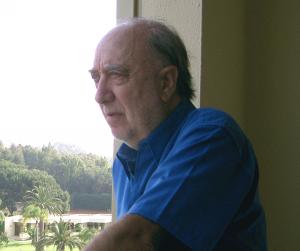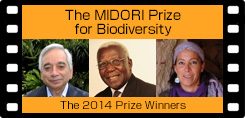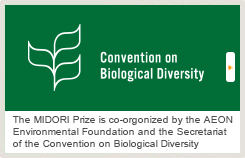15/10/2013
Blind to oceans - Juan Carlos Castilla -
I am extremely proud to have received the 2012 MIDORI Prize in Marine Biodiversity Conservation. Worldwide, marine biodiversity conservation is lagging behind terrestrial conservation. This is partially understandable since we are terrestrial individuals (animals) and we just see a very, very small portions of the sea. I keep saying that "we human beings are blind to the ocean." Even if we faced the ocean...we just see the surface of it. Luckily, the intertidal, sandy or rocky between tides area, is the only one 100% visible sea-land phase.
This is the zone of the ocean where I have worked all my life. I have done hundreds of basic observations about intertidal fauna and flora, biodiversity and above all on the ecological mechanisms that explain functioning. I have run many field experiments (that is way to do real science), created Marine Reserves in Chile to understand the role of humans in no-take areas and produce file guides for children. It is possible to do experiment by reducing or eliminating human interventions or fisheries in small coastal areas and thereby understanding human roles in these ecosystems. Humans are part of this sea-zone and they can impact them negatively or positively. From those experiences I have derived a grater understanding of oceans, since these areas are connected to sub-tidal and even more deep marine systems and million of people, for example artisan fishers, depend on them. My philosophical view is that we must understand these connections to use oceans more rationally, but that it is impossible aiming to 100% preservation of the oceans. Oceans are part of our daily life. We, marine scientists, must help to understand their functioning to keep them going and continuing to receive from ocean services, such as food, culture, aesthetics and recreation, to improve human well-being. I am not a deep ecologist at all. I am convinced humans can live in peace with the oceans. It is just a matter to understand how they work and for us, humans, to learn how to live in peace with them. It is up to us. It would be too simple to say: stop using the oceans and the problems will be solved. It is more complex than that. In Chile I have demonstrated that for instance small-scale artisan fishers can indeed live in peace with coastal oceans. It took us about 20 years to reach that point. It was a lot of basic and apply science, the use of local ecological knowledge, legislation and "marine education” what conducted us to that port. It can be done.
I thank the MIDORI for that recognition and invite readers to think about this: we are blind to oceans, therefore it is more difficult to care, respect and conserve something we do not see! This is to say, that is much more difficult to arrive to the port we did in Chile...but it can be done; we need science, to accumulate knowledge and to transfer that knowledge to our children and to the people at large.
(Juan Carlos Castilla, Professor, Marine Ecology, Department of Ecology, Pontificia Universidad Catolica de Chile, The MIDORI Prize 2012 Winner)











